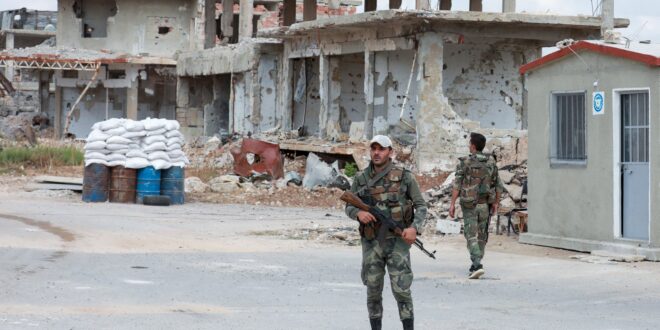Iran’s alleged aim to establish a drug trafficking corridor targeting Israel and Jordan has only intensified local resistance, 963 media writes.
In southern Syria, local factions in Nawa, a city in Daraa’s western countryside, have formed a joint force to “maintain security and protect the area,” according to Ahrar Horan. The new force, established after a recent meeting addressing the deteriorating security situation, represents all local groups and has implemented measures such as banning masks for civilians and military personnel and prohibiting celebratory gunfire, with violators facing strict consequences.
Escalating Tensions and Overlapping Controls
Suweida and Daraa, bordering Jordan and Israel, are strategically sensitive and have drawn Iranian influence despite local opposition. Iran has used this proximity to embed factions and assert control, creating friction in a region already struggling with kidnappings, assassinations, and drug trafficking. Despite Russian-brokered settlements, ongoing clashes between government forces, local factions, and pro-Iranian militias have left security fragile, while sleeper cells and local opposition continue to resist the government’s control.
The Syrian government views the southern region, spanning from Quneitra through Daraa to Suweida, as largely beyond its grasp. Damascus has tried to co-opt locals to serve its agenda, complicating an already fragmented power landscape that includes factions loyal to the opposition and groups aligned with Russia. Meanwhile, Suweida has seen sustained anti-government protests since August 2023, underscoring the deep-seated discontent in the Druze-majority province. Despite attempts by Damascus to quash these protests, including dispatching military reinforcements from Iranian-backed factions, tensions boiled over in June with clashes at a Syrian government checkpoint in Suweida’s north.
Iran’s alleged aim to establish a drug trafficking corridor targeting Israel and Jordan has only intensified local resistance, with assassinations targeting both civilians and local faction members. The violence was highlighted in August, when gunmen attacked the home of Sheikh Bahaa al-Jamal, a leader in the Local Forces faction, where he was hosting Sheikh Laith Waheed al-Balous and his brother Fahd al-Balous, prominent figures in the Rijal al-Karama faction. Al-Balous, who survived multiple assassination attempts, is now tasked with forming the General Authority for the Peaceful Movement, a role underscoring Suweida’s evolving resistance.
“Disturbing” Lawlessness and Rising Crime
The Violations Documentation Office of Ahrar Horan reports a surge in kidnappings in Daraa since Syrian government forces took control in mid-2018, with 456 cases documented by September 2024. Ransom demands are common, and victims endure physical and psychological abuse, fueling inter-clan tensions that exacerbate regional instability. Armed groups, operating with government protection and in cooperation with Bedouin tribes, have been implicated in kidnappings, assassinations, and looting, further jeopardizing civil peace.
Assassinations targeting government officials, opposition leaders, and civilians have also intensified since the 2018 settlements, highlighting the region’s deteriorating security environment. Brigadier General Munir al-Hariri, a former Syrian officer who defected, remarked that “there is no full containment of local factions in Daraa, even those aligned with Military Security and Air Force Intelligence.”
Drug-related crimes have surged, coinciding with an increased presence of pro-Iranian factions, including Hezbollah. This illicit trade has strained relations with Jordan, which has intercepted large drug shipments and clashed with smugglers along the border. Jordan’s frustrations have led to airstrikes on suspected drug storage and smuggling sites within Syria, resulting in civilian casualties.
Strategic Chaos
The instability in southern Syria serves multiple interests. For the Syrian government, it distracts the local population in regions it struggles to control, while for Iran, it is an opportunity to cement its influence, using the region as a base for drug and arms trafficking and as a strategic threat to Israel. The volatile security situation in Daraa and Suweida remains a critical point of tension in Syria’s complex landscape, with no resolution in sight.
 Eurasia Press & News
Eurasia Press & News



